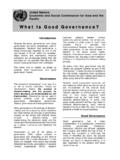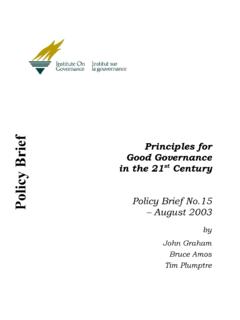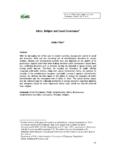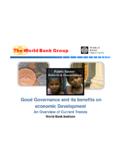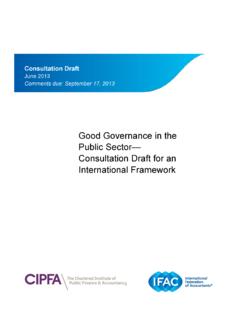Transcription of Condition for Success 1 ‘’Good Governance’’ - OECD.org
1 REPORT. Condition for Success 1 ' good governance ''. Coordinator and Author: Aziza Akhmouch, Administrator of the Water governance Programme of the Organisation for Economic Cooperation and Development (OECD). File name Report Report CG CS1 good governance Table of contents 1. Introduction .. 4. 2. Background and rationale of the Condition for Success 1 .. 5. 3. TSG's progresses: Target action plans, solutions and commitments .. 8. Target .. 8. Target .. 11. Target .. 14. Target .. 16. Target .. 20. Target ..22. 4. Outline of the limits of the approach and areas to be further investigated ..23. From a substantive point of view: ..23. From a process point of view:.. 24. 5. Recommendations for follow-up post 2012 .. 24. 6. Conclusion and commitments ..25. 7. Outcomes and key governance messages from previous World Water Fora..27. 8. Inventory of existing tools, practices and guidelines related to water governance .
2 33. This report includes inputs from CS1 target solution group (TSG) reports prepared by: Delphine Clavreul (OECD, target 1), Alexandre Brailowsky and Joannie Leclerc (SUEZ, target 1), Pierre-Alain Roche and Sol ne Le Fur (ASTEE-IWA, target 2). Daniel Valensuela (OIeau-INBO, target 3), Alice Aureli, Jose Luis Martin-Bordes and Lucilla Minelli (UNESCO, target 4), Alexandra Malmqvist and Teun Bastemeijer (WIN, target 5) and Donal O'Leary (TI, target 5), Lotten Hubendick and Hakan Tropp (SIWI, target 6). This report benefitted from the comments of Katherine Daniell, Hector Garduno, Sharon Megdal, Arianna Ardesi, H l ne Boussard, Karen Refsgaard, Matthew McKinney, Claire Charbit, Bill Tompson, Xavier Leflaive, C line Kauffmann, and Victor Duchovny. For any comments, feedback and suggestions please contact: (or + 33 1 45 24 79 30). The views and opinions expressed in this report are those of the authors and do not necessarily reflect the position of the International Forum Committee or its member organizations.
3 CS1 good governance 2. GLOSSARY. Directives: instructions issued by a central authority regarding certain end results that must be achieved. Directives at supranational level are used to bring different national laws in line with each other;. Regulations: principles, rules or laws issued by executives authorities or regulatory agencies of governments and designed to control or direct conducts or strategies Resolutions: formal statements of opinion, will or intent voted by an official body or an assembled body Conventions: general agreements or acceptances of certain practices between states for regulation of matters affecting all of them. Guidelines aim to streamline particular processes according to a set of sound practices. They are not binding but give guidance on how to proceed according to a course of action Tools are procedures or processes that can be used to achieve tasks. Recommendations are advice or procedures expressed to promote a favourable course of action Guiding principles are sets of rules that advice on goals, strategies, type of work and management Practices are methods or techniques showing positive results and that can be used as benchmarks Facility: Structure established to permit the easier performance of an action or a conduct ACRONYMS.
4 ASTEE: Association Scientifique et Technique pour l'Eau et l'Assainissement CS : Condition for Success EUREAU : European Federation of National Associations of Water and Wastewater IFC : International Forum Committee INBO : International Network of Basin Organisations ISO : International Standardization Organisation IWA : International Water Association IWRM : Integrated Water Resources Management MDG : Millennium Development Goal NGO : Non-Governmental Organisation OECD : Organisation for Economic Development and Co-operation OIEau : Office International de l'Eau ORU-FOGAR : Organisation des R gions Unies Forum Global d'Association des R gions RTWS: Right To Water and Sanitation SMART: Specific, Measurable, Achievable, Realistic Time-bound SIWI: Stockholm International Water Institute TSG : Target and Solution Group UNCCD: United Nation Convention to Combat Desertification UNECE: United Nation Economic Commission for Europe UNFCCC: United Nation Framework Convention on Climate Change UNGA: United Nation General Assembly WASH: Water Sanitation and Hygiene WATSAN: Water and Sanitation WIN: Water Integrity Network WISE: Wide-involvement Stakeholders Exchanges WWF: World Water Forum WISE: Wide-involvement Stakeholders Exchanges CS1 good governance 3.
5 WWF: World Water Forum 1. Introduction The 6th World Water Forum aims at developing concrete solutions and shifts the focus from issues and problems to defining how to implement existing and innovative responses. As such, it illustrates how better water management and policy can contribute to tackling the challenges currently facing the planet. Based on the outcomes of the June 2010 Kick-Off meeting held in Marseille, the International Forum Committee (IFC) Board adopted a thematic framework organised around 12 Priorities for Action and 3 conditions for Success , one of them being good governance . The 2nd Stakeholder Consultation Meeting, held on 17-18 January 2011 in Paris-La D fense, reinforced this orientation and formulated a series of SMART (Specific, Measurable, Achievable, Realistic Time-bound) and WISE (Wide-Involvement Stakeholder Exchanges) targets to be agreed in Marseille and achieved in the timeline set-up.
6 In this framework, the governance Core Group seeks to propose concrete, measurable and achievable solutions in terms of (i) effective public governance and institutions, (ii) integrated water resources management and (iii) better integrity and transparency in the water sector. Since February 2011, no less than six taskforces (around 300 contributors) have been working on pragmatic responses to water governance challenges and realistic roadmaps and action plans, based on existing evidence, tools, methodologies, experimentations, and good practices worldwide. These task forces are led by the following institutions: OECD and SUEZ. Environnement (Target 1 Stakeholders' engagement for effective water policy and management ), ASTEE-IWA (Target 2 Performance measurement, regulation and capacity building in the water sector ), INBO (Target 3 Basin Management Plans as Instruments for Water governance ), UNESCO (Target 4 IWRM through the lens of water security, adaptive water management and international legal instruments for good governance ), WIN TI (Target 5.)
7 Integrity and anti-corruption policies in the water sector ) and SIWI (Target 6 Information, transparency and accountability in the water sector ). This synthesis report summarises the work undertaken over the past year. Taking stock of the outcomes and key messages of previous WWF on water governance , it enshrines the issue of governance and implementation in the current political agenda and provides preliminary guidance on how to overcome governance obstacles to foster integrated and sustainable water management. The report also provides: Recommendations for the follow-up beyond Marseille A review of outcomes of previous World Water For a on governance A comprehensive inventory of existing tools, practices and guidelines to be further updated beyond Marseille The report ends with concrete commitments on good governance in the water sector to be implemented up to and beyond Marseille 2012. CS1 good governance 4.
8 2. Background and rationale of the Condition for Success 1. The water crisis the world community faces today is largely a governance crisis. Securing water for all, especially vulnerable populations, is often not only a question of hydrology (water quantity, quality, supply, demand) and financing, but equally a matter of good governance . Managing water scarcity and water-related risks (floods, natural disasters etc.) requires resilient institutions, collaborative efforts and sound capacity at all levels. good water governance is therefore a key Condition of Success to ensure everyone's well-being, contribute to economic development and keep the planet blue, but also to foster peace and stability. In the absence of optimality and magic blueprint to foster good governance in the water sector, mutual exchange across countries and stakeholders is the best way to learn from past Success and failure and develop place-based and home-grown solutions.
9 > Definitions of multi-level water governance The Global Water Partnership (GWP) defines water governance as the range of political, social, economic and administrative systems that are in place to develop and manage water resources, and the delivery of water services, at different levels of society . Many other agencies have subsequently adopted the same definition, including the World Bank. GWP proposes two broad sets of principles that underpin effective water governance : First, that approaches be transparent, inclusive, equitable, coherent and integrative. And second, that performance/operations be accountable, efficient, responsive, and sustainable (Rogers and Hall, 2003). For UNDP, water governance addresses: Principles such as equity and efficiency in water resource and services allocation and distribution, water administration based on catchments, the need for integrated water management approaches and the need to balance water use between socio-economic activities and ecosystems.
10 The formulation, establishment and implementation of water policies, legislation and institutions. Clarification of the roles of government, civil society and the private sector and their responsibilities regarding ownership, management and administration of water resources and services. Water governance is therefore the set of systems that control decision-making with regard to water resources development and management. It is therefore more about the way in which decisions are made ( how, by whom and under what conditions ) than about the decisions themselves (Moench et al., 2003). It covers the manner in which roles and responsibilities (design, regulation and implementation) are exercised in the management of water and broadly encompasses the formal and informal institutions by which authority is exercised. The emphasis on the politics of water is reinforced by Stockholm International Water Institute (SIWI) which states that water governance determines who gets what water, when and how.











